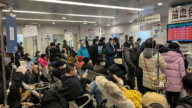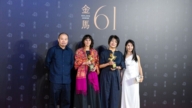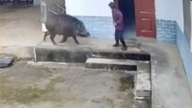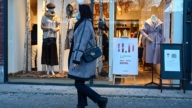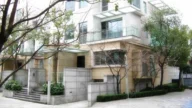【新唐人2013年12月05日讯】在大陆,看病难、住房难、上学难,被称为是压在百姓头上的“三座大山”,尤其其中的看病难,持续几十年位居“三座大山”之首。因此大陆民间又流传着“小病拖,大病扛,重病等着见阎王”的说法,民众都不敢到医院看病。然而,令人们意想不到的是,中共官员爆出,大陆医保基金已经连续多年大量结余,引发舆论一片哗然。
据大陆《经济参考报》报导,在日前举行的中国卫生经济学会第十六次年会上,北京市卫生局副局长雷海潮指出,到2012年底,全国城镇基本医疗保险累计结余7644亿元。
雷海潮还透露,从1999年到现在,除了2010年以外,大陆城镇基本医疗保险基金结余率每年都在20%以上,其中2001年的结余率最高达到35%。而在此之前,另一位中共官员也曾向媒体透露,2007年和2008年连续两年,医保基金结余率都达到了30%以上。
有专家指出,医保基金使用原则应该是当年收支平衡,不应当有过多结余,而目前大陆医保基金结余的比例,已经远远高于发达国家最高10%的结余率。
中国卫生法学家张赞宁:“很多国家医疗保险都是超支,但是我们国家却有结余。我觉得这很不正常。”
一方面是老百姓看病难、看病贵,参保者抱怨报销比例低,另一方面,由人力资源和社会保障部管理的城镇基本医疗保险,长达十几年存在着“钱多的花不出去”的怪现象。医保基金长期大量结余,和百姓低标准的医保待遇,形成鲜明对比。
张赞宁:“老百姓虽然有医疗保险,但是要动用医疗保险还是有很多困难。比如每个人一般情况下,一年只规定给予几百块或者几千块报销,这个钱用完了,那就全部要自己出。在报销问题上,对老百姓看病的时候可能卡的过死,卡的过严,有些该报销的,由于它卡的过严就不给予报销,医疗保险费用就有结余了,就用不出去了。”
尽管年年结余,医保基金的管理者们依然不断呼吁职工、居民和农村提高缴费比例,另一方面又要求中央财政提高补贴资金。而对于每年数千亿的医保基金结余去向,管理者们却从没有向民众公开过。
那么,民众缴纳的医疗保险费用究竟流向何方?经大量数据证实,绝大部分的医疗资源被用在了中共权贵阶层及他们的裙带关系身上,真正用在普通民众身上的微乎其微。中共卫生部原副部长殷大奎曾经透露,80%的医疗费用在为850万党政干部群体服务,而其他十几亿普通平民,却只能共享剩余的20%医疗资源。
张赞宁:“现在我们大陆医疗保险是很不平等的,有一种医疗是不受任何限制的,就是离休人员。一般是在四九年以前参加工作的,就所谓打天下的那些人,他们是不受限制的,任何药物都可以实报实销,而且自己不需要消费一分钱,所以一旦一家有个离休人员的话,他们全家都可以享受国家的免费治疗。”
以四川省自贡市为例,2009年,自贡全市征收居民医疗保险费6544万元,全年支出仅2466万元,结余高达4079万元,而在离休干部身上,全市征收医疗费统筹基金1974万元,支出2246万元,结余负72万元。用在民众身上的医疗保险费用不到30%,而离休干部的医疗支出居然出现了负数,那么这72万从哪里挪用,不言而喻。
张赞宁:“所以我觉得主要是医疗不公、配置不公,造成了这种情况,我认为医疗保险应当是全民的,应当是平等待遇,但是在中国这个等级制度非常森严。”
此外,中共监察部副部长屈万祥也承认,还有一部分的医保基金结余,进入了地方和基金管理部门的口袋,被中共官员贪污挪用。
一名上海网民作诗讽刺:大众无钱苦,医保大结余,都是民脂血,为何不返民,各种奇怪事,尽出在当局。
采访编辑/张天宇 后制/钟元
Where Does China’s $125.5 Billion Healthcare Insurance Surplus Go?
In Mainland China, people are facing what
has been called the “three big mountains".
These are difficulties in medical care, housing and education.
Out of these three issues, medical care has been ranked
as the number one problem for 10 consecutive years.
People mock with the words, “minor illness is delayed, major
illness is endured, and with severe illness, one waits to die."
Chinese Communist Party (CCP) officials claim that for
several years, healthcare insurance has had surplus funds.
This has aroused public criticism.
Chinese Economic Information newspaper
reported on a recent annual meeting of
the China Health Economics Association.
At the meeting, Lei Haichao, Deputy Director of
Beijing Health Bureau, said that the surplus of the
national urban basic medical insurance fund had
reached 764.4 billion Yuan ($125.5 billion) by 2012.
Lei also said that since 1999, the surplus rate
has exceeded 20% every year, except in 2010.
The surplus rate hit 35% in 2001.
Prior to this, another official also told media that
the surplus rate exceeded 30% in 2007 and 2008.
Experts say that paying in and out of healthcare
funds should balance out during the year.
There should not be a surplus.
The surplus rate in China is far higher than developed
countries, which often controlled at an average below 10%.
Zhang Zanning, medical lawyer: “Healthcare
insurance in many countries is overspent.
However, our country has a surplus. I think it is not right."
Civilians find it difficult to see the doctor, and it
is expensive, so the reimbursement rate is low.
The Ministry of Human Resources and Social Security
administration tightly controlled the urban healthcare insurance fund,
causing the surplus over 10 years.
This long-term healthcare insurance fund surplus obviously
contrasts with civilians’ low standard of healthcare insurance.
Zhang Zanning: “Although people have healthcare
insurance, it is still difficult for them to claim their fees.
For example, one is only allowed to claim
several hundred to several thousand Yuan a year.
If the claim amount is exceeded, the
rest of the cost will be paid by oneself.
The process of reimbursement for civilians is overly strict.
When someone is eligible for reimbursement,
the amount is cut, and they never get it.
Thus, the healthcare insurance fund
has a surplus, as it hasn’t been used."
Despite a yearly surplus, healthcare insurance
administration officers still repeatedly urge people
to pay increased insurance fees.
In addition, they also demanded the Central financial
departments to raise the compensation funds.
Yet, the use of these several hundreds of billions of surplus
funds every year has never been disclosed to the public.
Where has the money gone?
Data indicates that the money has been spent by
the CCP’s privileged groups, and their contacts.
Only a small amount of the funds has been spent on civilians.
Yin Dakui, Former Deputy Minister of Healthcare revealed
80% of funds were spent on 8.5 million CCP members.
Yet, the billions of Chinese civilians are only
able to use the 20% of the funds that are left.
Zhang Zanning: “Now our healthcare insurance is not fair.
One kind of healthcare insurance has no
restrictions for retired senior CCP cadres.
If one started working before 1949, they
have no limit for reimbursing medical costs.
They don’t need to spend a penny for their healthcare.
Thus, if one family has such a retired cadre, their
family can enjoy national medical care for free."
For example, in 2009 in Zigong City, Sichuan Province,
the healthcare insurance fees collected from civilians
was 65.4 million Yuan ($10.7 million) during one year.
Only 24.7 million Yuan ($4.05 million) has been
paid out, so 40.8 million ($6.7 million) was surplus.
The insurance collected from retired cadres
in Zigong was 19.7 million Yuan ($3.23 million).
It paid out 22.5 million Yuan ($3.69 million),
leaving a deficit of 720,000 Yuan ($110,000).
If there is only 30% of healthcare insurance spent on
civilians, but retired cadres’ expenditure has negative
figure, then how does one find 720,000 Yuan ($110,000).
Zhang Zanning: “Thus, I think medical care is unequal,
and the distribution is unequally causing the problem.
I think healthcare should be equal, but
in China, it is a strict hierarchical system."
Qu Wanxiang, Deputy Minister of Supervision admits
that part of surplus fund of healthcare insurance
runs into the local fund administration departments.
It is also embezzled by corrupt officials.
A Shanghai netizen satirized it with a poem:
“Civilians have suffered from no money.
The huge surplus of healthcare
insurance belongs to civilians.
Why can the fund not be returned to civilians?
The regime caused all kinds of strange things."
Interview & Edit/ZhangTianyu Post-Production/ZhongYuan


